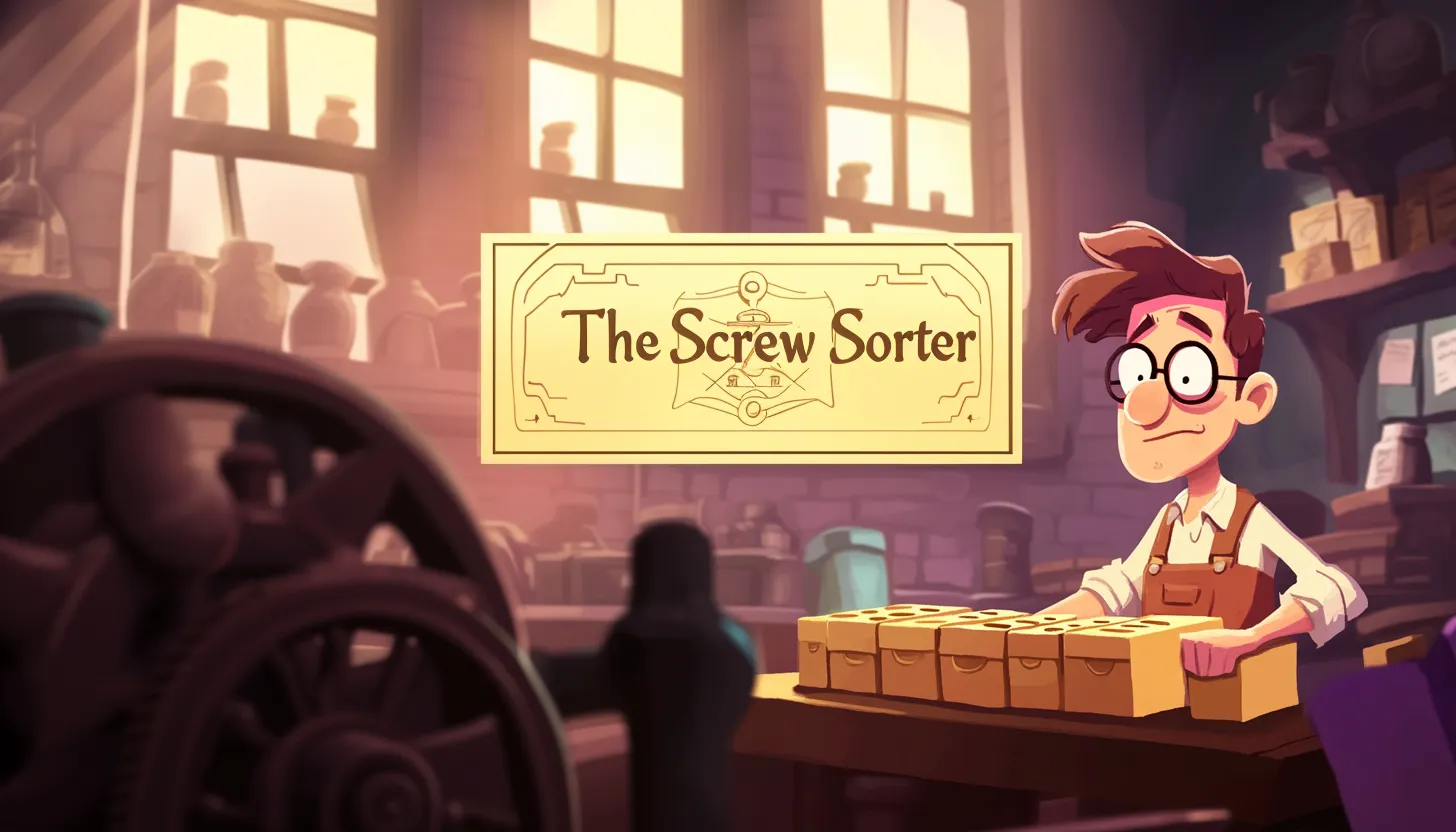Once upon a time, in a place not too far away but perhaps too simple for the eyes of those who don’t pay much attention, there was a man named Elmer Wren. His job, to everyone else, seemed like the most boring job in the entire kingdom. Elmer was a screw sorter at the King's Factory of Metals and Odd Things. His task, day after day, was to separate, organize, and sort thousands of screws of all shapes, sizes, and colors. Big screws, tiny screws, screws with round heads, screws with square heads, screws that shone like stars and others that seemed to have forgotten how to shine.
To anyone watching from afar, Elmer’s job would seem like the very definition of boring. He sat on a creaky wooden chair, with an endless table in front of him, covered with boxes and more boxes of screws waiting to be sorted. The sounds of the factory, the endless hammering, the buzzing of machines, and the screeching of bending metal filled the air. But none of that bothered Elmer. In fact, he didn’t see anything boring about his job. To Elmer, each screw was a masterpiece, a marvel of engineering, and beyond that, a tiny part of the great puzzle of the universe.
While most of the workers at the factory spent their day watching the clock, waiting for lunch or the end of the day, Elmer dove into his work completely. Every time his hands picked up a new screw, he felt a kind of tingling in his fingertips. He examined them with such precision that it would astonish even the most dedicated scientist. Each little metal cylinder was, in its own way, perfect. Some had marks from being carefully crafted; others had tiny imperfections that Elmer found charming, as if each flaw told a secret story.
For him, sorting screws wasn’t just a mechanical task. No, it was a precise dance, a symphony of shapes and sizes. In every screw he organized, he saw the mathematical balance of the world. How could something so small hold up huge structures, keep doors shut, or bridges steady? Screws, Elmer thought, were the unsung heroes of the kingdom, the little wonders that kept everything in place. And his job, though invisible to others, was to make sure each screw found its place in the world.
While the other workers shuffled from one task to another, Elmer found a satisfaction that few could understand. For him, sorting screws by size and thickness wasn’t a mechanical act, but almost magical. It was, in fact, a daily ceremony, a ritual of connection between order and chaos. In his mind, Elmer firmly believed that every misplaced screw could lead to the collapse of something important in the kingdom. What would happen if a small screw, wrongly sorted, ended up in a bridge instead of a simple chair? The disaster could be enormous. In his hands, he believed, lay the stability of everything the kingdom’s people took for granted.
But the most wonderful thing was how Elmer saw beauty in his work. Sometimes, as he watched the shiny silver screws, he imagined each one as a tiny star. Lining them up on the table was like organizing constellations. And when he finally sorted them into their small wooden boxes, he felt a satisfaction only great artists know: the joy of creating order out of chaos. While the rest of the world passed by, unaware of the importance of his work, Elmer saw everything with eyes full of wonder.
Every screw that passed through his hands had a story to tell. Rusty screws spoke to him of old times, of projects that never saw the light of day or forgotten structures. The shiny screws, on the other hand, promised new possibilities: ships yet to be built, castles to rise, mechanisms that would change the world. Elmer could spend hours contemplating just one of these tiny objects, letting his mind wander through the secrets they held. Where did it come from? What role would it play in the vast web of existence? These thoughts, though senseless to others, filled him with deep happiness.
Time didn’t pass in the usual way for Elmer. The hours slipped by so softly they were hardly noticeable. While the other workers stared desperately at the clock, waiting for the end of the day, Elmer lost track of time as he sorted, categorized, and gently stroked the edge of each screw, like they were old friends.
His world was small, but within it was a greatness only he could see. And though the other workers often looked at him with wonder, or even a little confusion at his dedication and enthusiasm, Elmer never felt misunderstood. In his mind, they just hadn’t discovered the secret of the screws, the magic that lived in each small piece of metal.
In fact, Elmer didn’t need recognition or applause. For him, the true reward was the deep inner peace he felt at the end of each day, when all the boxes of screws were neatly organized and every piece had found its place. It was then, while the other workers hurried home, that Elmer stayed a few minutes longer in the factory, admiring the perfectly lined-up boxes. And in those moments, he couldn’t help but smile. Because, for him, in that little corner of the world where there were only screws, he had found a meaning, a purpose, bigger than anything anyone else could imagine.
And so, while the world moved on, Elmer lived each day with an excitement that seemed out of place for his job. But he knew that the most important thing wasn’t what others saw. The most important thing was how he saw his own world—a world where every screw was a tiny jewel of perfection, a world where the ordinary was, in fact, extraordinary.




